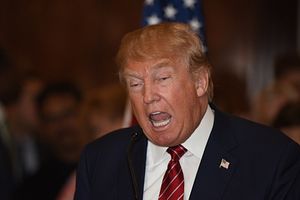Donald Trump, the current frontrunner for the Republican presidential nomination, has consistently attacked free trade with China for robbing Americans of jobs and inundating the U.S. with cheap products. While there is some truth to Trump’s allegations that China has acquired jobs that were formerly based in the U.S., mostly through American multinationals choosing to move overseas, his argument is a gross oversimplification of reality and undermines the U.S.-China relationship.
Certainly, some regions of the U.S. have lost jobs due to the decisions of multinational corporations to invest directly in China. Low-skilled jobs in the U.S. are relatively scarce at this point as a result. However, job movement overseas resulted from economic restructuring and rising wages in the U.S., and China itself is now experiencing some movement of jobs to other countries as wages and skills have risen. Average hourly wages in the U.S. have more than doubled since 1990 (from about $10) and those in China have risen more than tenfold.
The U.S. has spent decades building a positive relationship with China and Trump seeks to undo that. While some view Trump as “speaking the truth” that other politicians are afraid to divulge, educated Americans do not view China as a menace. The U.S. relationship with China was carved out or strengthened by business and trade ties, as American multinationals and businesses sought to set up shop in China, and as China heavily reduced trade barriers to accommodate an inflow foreign goods. China’s accession to the World Trade Organization, of which the U.S. is a major player, forced China to lower its trade barriers to foreign imports, which if anything presented challenges to China’s domestic economy (not America’s) as competition widened.
Americans became accustomed to a consumption-based economy, much of it driven by inexpensive goods from multinationals producing in China. Prices of telecommunications and information technology declined, expanding access to high value-added, efficiency-boosting products for less. To some extent, in real terms, American incomes have been increased by cheaper production.
Moreover, despite Trump’s and other politicians’ complaints in the U.S. that China’s currency is undervalued, it can be reasonably argued that the RMB is fairly valued. The IMF confirmed last year that this is the case, since despite a recent devaluation, the currency has appreciated in value since 2005. The flip side of China’s current account surplus with the U.S. is the massive accumulation of dollar-denominated Treasuries by China, yet American politicians do not argue that the dollar has an unfair advantage in acting as a global reserve currency.
Trump’s position undermines the strong bonds between the United States and China. Even though reshoring of multinationals may benefit the U.S. to some extent, lobbing accusations against China and reversing the process of globalization will not stand politically or economically. Trump’s campaign website states, “when Donald J. Trump is president, China will be on notice that America is back in the global leadership business and that their days of currency manipulation and cheating are over.” This type of attitude scapegoats China for American economic woes, and assumes that somehow, the U.S. hegemon was duped by a nation transitioning from a command economy.
Economic issues need to be addressed delicately by foreign policymakers, with the aim of maintaining an atmosphere of peace, cooperation, and economic growth. Donald Trump threatens to compromise the strong U.S.-China relations that have ushered in decades of prosperity for many American and Chinese citizens.

































